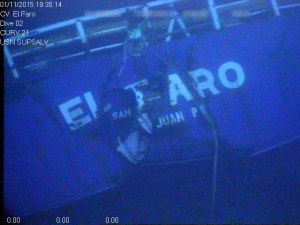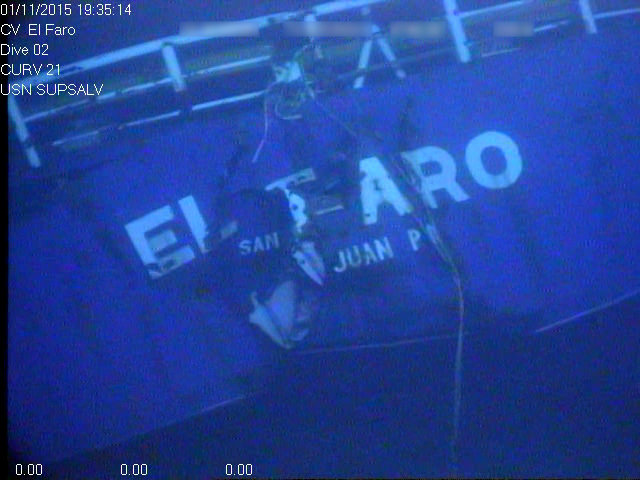Federal accident investigators on Tuesday will determine the probable cause of the sinking of the cargo ship El Faro, the worst maritime disaster for a U.S.-flagged vessel in decades that resulted in the deaths of 33 mariners.
The National Transportation Safety Board is expected to issue more than 50 safety recommendations related to the Oct. 1, 2015, loss of 790-foot-long (240-meter) ship near the Bahamas.
The fully loaded El Faro sank about 34 hours after leaving Jacksonville, Florida, on a cargo run to Puerto Rico. The freighter lost propulsion while sailing through Hurricane Joaquin, eventually coming to rest 15,000-feet (4,570 meters) on the sea floor.

The NTSB says the board will address problems with weather forecasting, management of the ship, the suitability of the ship’s lifeboats and the oversight of the vessel by its owner, TOTE Maritime, Inc.
The board’s final report comes after one issued by the U.S. Coast Guard on the second anniversary of the ship’s sinking. The Coast Guard’s report found the primary cause to be with the ship Capt. Michael Davidson, who they said underestimated the strength of the hurricane and overestimated the 40-year-old ship’s strength.
According to transcripts of audio recovered from the ship’s voyage data recorder, or “black box,” Davidson refused suggestions by his crew to take a slower, safer route as the storm grew into a Category 3 hurricane.
The recorder caught the final hours of the ship’s increasingly desperate crew as they tried to save the El Faro and themselves.
But the Coast Guard also said the ship’s owner TOTE had violated safety regulations to ensure the crew was well rested, and that the company had not replaced a safety officer management position.
TOTE also had stopped employing port helpers who helped safely load cargo on the ships. The Coast Guard found that El Faro’s crew had difficulty keeping up with the brisk loading pace required to keep the ship on schedule.
The ship also had open-top lifeboats, unlike the closed-top lifeboats used on modern ships. While legal, the ship’s use of the older-style boats was only allowed because of an exemption to safety rules for older ships like the El Faro.
The Coast Guard is seeking civil penalties against TOTE, but not criminal.
Larry Brennan, a professor of maritime law at Fordham Law School and a retired U.S. Navy captain, said the NTSB’s findings could create a safer working environment for mariners in the future. For example, the board could help by calling for the removal of the safety exemption that allowed the El Faro to legally use old lifeboats.
“No one should use open boats in rough weather, or any weather,” Brennan said. “If the NTSB takes an aggressive course, they may be able to effectively change regulations and policies that will enhance safety at sea.”
Was this article valuable?
Here are more articles you may enjoy.


 AI Got Beat by Traditional Models in Forecasting NYC’s Blizzard
AI Got Beat by Traditional Models in Forecasting NYC’s Blizzard  AI Claim Assistant Now Taking Auto Damage Claims Calls at Travelers
AI Claim Assistant Now Taking Auto Damage Claims Calls at Travelers  When the Workplace Is Everywhere: The New Reality of Workers’ Comp Claims
When the Workplace Is Everywhere: The New Reality of Workers’ Comp Claims  Stellantis Weighs Using China EV Tech for Affordable Cars
Stellantis Weighs Using China EV Tech for Affordable Cars 